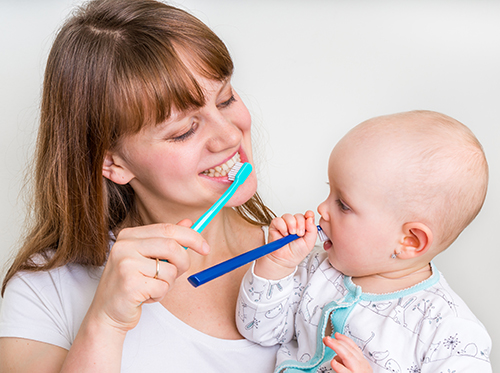
Why all the fuss about fluoride? Your dentist recommends it, your toothpaste is formulated with it, most of our drinking water contains it. Just what is it about this mineral that makes dental professionals sing its praises? Read on for three good reasons why fluoride is a healthy choice for healthier teeth.
- Fluoride Works!
Fluoride is an attractive option for protecting your teeth—and we mean that literally. Fluoride protects the surface of your teeth by working on a molecular level to attract minerals which strengthen enamel and help prevent cavities.
Our tooth enamel is mostly made from calcium and phosphate ions. These elements combine to form hydroxyapatite, strong crystals which make up about 95% of our enamel. Hydroxyapatite is so strong, in fact, that tooth enamel is the hardest part of our bodies. What can go wrong?
Acids. Acids created by the bacteria in plaque and the acids in our diet strip away the calcium and phosphate ions in enamel, weakening the surface of the tooth. This process is called demineralization. Over time, weak spots become bigger as acids eat through enamel to the inner tooth, causing decay and cavities.
So, what can fluoride do?
First, fluoride helps remineralize tooth enamel. Fluoride is attracted to the tooth’s surface and bonds with its minerals. It also attracts the calcium and phosphate ions which are found in our saliva to restore any minerals which have been lost. This process helps repair any weak spots that might have begun to form.
But fluoride does more than restore and repair tooth strength—it improves it! Fluoride ions join with calcium and phosphate to form fluorapatite crystals, which are larger and stronger than hydroxyapatite crystals.
Want more? Fluoride may interfere with bacterial plaque’s ability to produce acids. Since plaque and its acids are a major cause of gum disease, brushing with a fluoride toothpaste is a great way to help prevent plaque buildup around and below the gum line—buildup that leads to irritated, inflamed, and infected gum tissue.
- Fluoride Is Doubly Effective
Fluoride works both externally and internally. We just looked at how fluoride helps keep teeth strong when applied to the outside of the teeth. This is called a topical application. Systemic benefits come the fluoride we consume in our diets.
Fluoride isn’t found in many foods, but it is found naturally in lakes, rivers, and other water sources. When the local water’s fluoride level is low, many communities add fluoride for its proven ability to prevent cavities. Water fluoridation is safe, has been studied for decades, and has been shown to reduce the risk of cavities by 25% or more for both children and adults.
Systemic fluoride is especially important for your child’s dental health. This is because fluoride incorporates with minerals in the adult teeth while they are growing and developing, creating stronger, more cavity-resistant teeth even before they erupt. Most adult teeth have finished forming around age eight, so, if your community doesn’t have fluoridated water, it’s a good idea to discuss other options with your child’s dentist.
And we grown-ups benefit, too! When you drink fluoridated water, you’re increasing the amount of fluoride in your saliva. Just like fluoride toothpaste, saliva bathes your teeth with fluoride ions, strengthening the tooth surface, and helping to neutralize the acids which damage teeth and gums.
- It’s Easy to Get Fluoride Protection
Most toothpastes are formulated with fluoride, so you’re getting the enamel-strengthening benefits of this mineral whenever you brush—at least twice each day. Since children can’t really grasp the “rinsing” and “spitting” steps of the brushing routine just yet, talk to Dr. Milillo, and Dr. Saldivar about how to introduce tiny amounts of fluoride toothpaste to your child’s dental routine. Baby steps!
Because so much of our drinking water is fluoridated, most of us really don’t have to think about how to get the recommended amount of fluoride each day. If your community’s water is low in fluoride, we can help you here as well. Prescription fluoride rinses, gels, supplements, and other treatments are available to make sure that your teeth are well-protected, wherever you may live. We will let you know which products are best for you and how often to use them during your next visit to our West Chester, Pennsylvania dental office.
Fluoride isn’t, of course, the only way to look out for your dental health. Proper brushing and flossing are still essential for removing plaque. Check into sealants for both kids and adults for long-lasting protection for chewing surfaces. But when it comes to a proven cavity-fighter and plaque-reducer that is simple to use, effective, and easily available—is it any wonder we’re big fans of fluoride?




